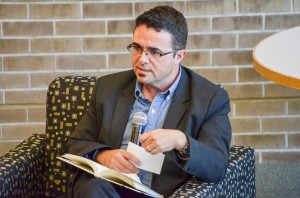This past Wednesday, David Cook-Martin, Sociology and Niraja Jayal, International Visiting Fellow, addressed an attentive audience in Burling Library regarding the topic of citizenship.
“Citizenship is a status that gives access to some of the rights we enjoy,” Cook-Martin said.
As Cook-Martin and Jayal sought to answer questions about the quest for citizenship, they focused their scopes on very different, yet comparable study groups.
Cook-Martin read a chapter from his new book, “The Scramble for Citizens: Dual Nationality and State Competition for Immigrants.” He talked about how some Argentinian citizens seek to establish dual-citizenship in Italy and Spain, places where there ancestors once migrated from. Often they must go to extreme lengths to scrounge up the proof of this ancestral migration. Yet oddly enough, many of the Argentinians that Cook-Martin encountered referred to their acquisition of dual-citizenship as simply “a piece of paper.”
This description was starkly different from the one that Jayal encountered—that of dual-citizenship as a “jewel.” Jayal’s book, “Citizenship and its Discontents: An Indian History,” is about the theme of Indian citizenship in the 20th century.
Jayal discussed her research of the immigration into India of some Pakistani Hindus after political and economic unrest in their home country. These immigrants, who were most often from the lowest social classes, sought citizenship in India as a way to access rights previously denied to them.
“Citizenship is key to everything, even to apply for electricity,” Jayal said.
Their differing experiences brought both professors to delve into a stimulating discussion regarding the factors that created this discrepancy. The audience became involved as well, offering suggestions or further questions.
“The migrants I spoke with encountered a great amount of hostility. They do backbreaking work, and even then, people [Indians] are upset they have any work at all,” Jayal said.
Citizens value citizenship very differently depending on their circumstances. Those in India were driven by the immediate need for basic amenities, while the Argentinians, coming from a place of greater privilege, believed their European citizenship could be useful in the distant future.
Citizenship is still a hotly debated issue within the U.S. and similar dynamics of citizenship can be seen in places all around the world, such as the ones Jayal and Cook-Martin discussed. There are still many questions surrounding this issue, but the first step is to start thinking about it and engaging in a wider discussion, as was done in Burling Library.




















































